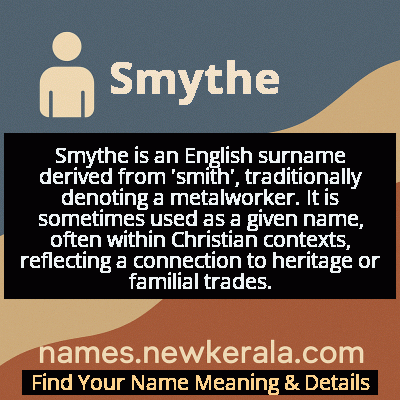Smythe Name Meaning & Details
Origin, Popularity, Numerology Analysis & Name Meaning of Smythe
Discover the origin, meaning, and cultural significance of the name SMYTHE. Delve into its historical roots and explore the lasting impact it has had on communities and traditions.
Name
Smythe
Gender
Male
Origin
Christian
Lucky Number
9
Meaning of the Name - Smythe
Smythe is an English surname derived from 'smith', traditionally denoting a metalworker. It is sometimes used as a given name, often within Christian contexts, reflecting a connection to heritage or familial trades.
Smythe - Complete Numerology Analysis
Your Numerology Number
Based on Pythagorean Numerology System
Ruling Planet
Mars
Positive Nature
Generous, passionate, energetic, and humanitarian.
Negative Traits
Impulsive, impatient, moody, and can be overly emotional.
Lucky Colours
Red, maroon, scarlet.
Lucky Days
Tuesday.
Lucky Stones
Red coral, garnet.
Harmony Numbers
1, 2, 3, 6.
Best Suited Professions
Military, sports, philanthropy, leadership roles.
What People Like About You
Courage, energy, leadership, generosity.
Famous People Named Smythe
John Smythe
Military Commander
Served under Queen Elizabeth I and authored important military treatises
Thomas Smythe
Merchant and Colonial Administrator
First governor of the East India Company and treasurer of the Virginia Company
William Smythe
Academic and Bishop
Founded Trinity College Dublin's first library and contributed to Irish education
Sir John Smythe
Soldier and Author
Military theorist who wrote 'Certain Discourses Military'
Name Variations & International Equivalents
Click on blue names to explore their detailed meanings. Gray names with will be available soon.
Cultural & Historical Significance
During the 16th and 17th centuries, the Smythe spelling became particularly associated with prominent merchant families and colonial administrators who helped shape the British Empire. Notable Smythe families established themselves in London's merchant class, with several serving as governors of trading companies like the East India Company and the Virginia Company. This connection to trade and colonization meant the name spread throughout the English-speaking world, particularly to North America, Australia, and other British colonies. The name's evolution from a humble trade designation to a marker of social standing demonstrates how occupational surnames could transform into symbols of family heritage and social mobility.
Extended Personality Analysis
Individuals bearing the Smythe surname are often perceived as embodying characteristics associated with their ancestral trade - practical, resilient, and skilled problem-solvers. The historical blacksmith's role required physical strength, precision, and the ability to transform raw materials into useful objects, traits that metaphorically translate to determination, craftsmanship, and practical intelligence in modern personality associations. There's a cultural expectation of reliability and steadfastness, much like the durable metalwork produced by their namesake ancestors.
Beyond the practical associations, the Smythe name carries connotations of entrepreneurial spirit and social mobility. Historically, successful blacksmiths often became respected community leaders, and this legacy suggests ambition, business acumen, and leadership potential. The name's connection to prominent merchant families further reinforces associations with strategic thinking, negotiation skills, and the ability to build lasting institutions. Modern bearers of the name might be perceived as having a strong work ethic, traditional values combined with innovative thinking, and the capacity to 'forge their own path' in life, maintaining the transformative quality inherent in the smithing trade.
Modern Usage & Popularity
In contemporary times, Smythe maintains its status as a distinguished surname with strong English heritage connections. While less common than the standard 'Smith' spelling, Smythe is often perceived as more aristocratic or historically significant. The name appears frequently in professional circles, particularly in law, finance, and academia, where its historical gravitas lends an air of established credibility. According to surname distribution data, Smythe remains most prevalent in the United Kingdom, especially in southern England, with significant populations in former British colonies including the United States, Canada, Australia, and New Zealand. Recent years have seen a mild resurgence in interest in traditional surnames, with some parents choosing Smythe as a first name to honor family heritage or convey a sense of historical connection. The name's usage in business contexts often signals tradition and reliability, making it popular for luxury brands, legal firms, and financial institutions seeking to project established credibility.
Symbolic & Spiritual Meanings
Symbolically, Smythe represents transformation, strength, and creation - metaphors deeply rooted in the blacksmith's craft of shaping raw metal into functional and beautiful objects. The name embodies the alchemical process of turning base materials into valuable tools, symbolizing personal growth, resilience under pressure, and the ability to create order from chaos. Like the forge that tempers steel, the Smythe name suggests endurance through challenges and emerging stronger from adversity. It also carries connotations of utility and service, reflecting how blacksmiths served essential roles in their communities.
The anvil and hammer associated with smithing symbolize steadfastness and constructive power, while the fire represents passion, purification, and transformative energy. In broader symbolic terms, Smythe evokes the archetype of the maker or creator - someone who builds, fixes, and improves their world through skill and determination. The name's historical connection to social mobility adds another layer of symbolism, representing the potential for reinvention and upward movement through merit and hard work. This multifaceted symbolism makes Smythe a powerful name representing both traditional values and transformative potential.

